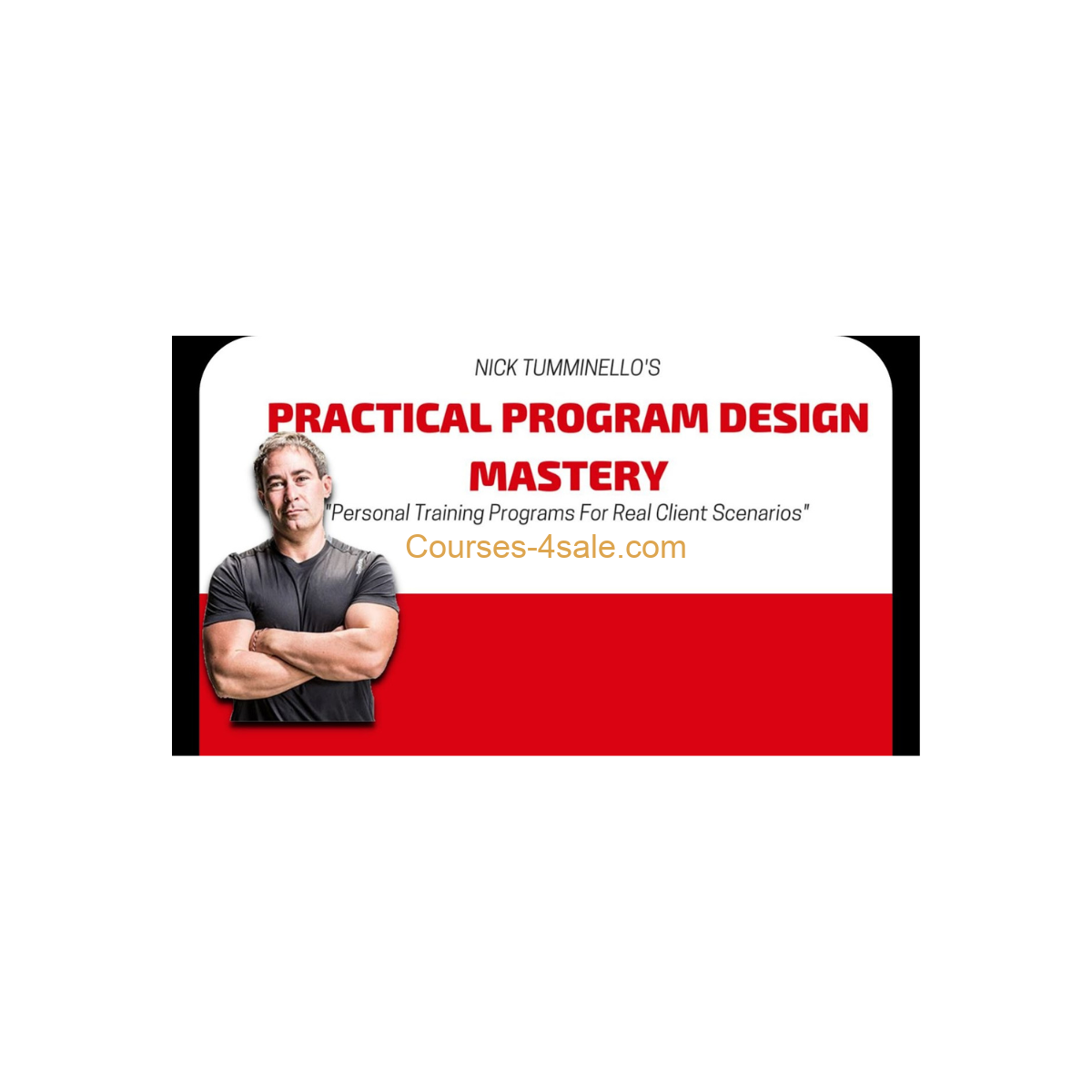Have you ever been overwhelmed by the variety of fitness regimens and not known which one is right for you? Or maybe you’re a fitness instructor trying to improve your skills using designs of programs that have scientific backing? Join us as we dissect the fundamentals of designing successful exercise regimens, with the help of Nick Tumminello’s Practical Program Design Mastery experience.
The Significance of Program Design
There are so many different exercise regimens available these days that it might be daunting. But program design is fundamental to a successful fitness journey, regardless of the goal—weight reduction, muscle gain, or enhanced sports performance. Approximately 66.9 million individuals utilize health clubs in the United States alone, according to data from the International Health, Racquet & Sportsclub Association (IHRSA, 2019). This is a reflection of the increasing focus on customized fitness regimens to meet the demands of each individual.
Customized Exercise for Specific Objectives
Imagine entering a tailor’s shop and having a suit made to fit your exact measurements. The ideal level of comfort and happiness comes from a perfectly fitted item that is neither too tight nor too loose. Likewise, a well-crafted exercise regimen need to be customized to meet the needs of various body types and personal objectives. The method used by Nick Tumminello allows for the creation of such customized workouts that match particular goals, ranging from aerobic endurance to strength training.
The Fundamentals of Realistic Program Development
Evidence-based approaches are the cornerstone of the methodology of Nick Tumminello – Practical Program Design Mastery. This means that programs aim to maximize effort for optimal outcomes rather than just pushing weights or running long distances. Let’s dissect it:
Evaluate, Don’t Assume
Assessment is one of the most important phases. This entails assessing your level of fitness right now, being aware of any restrictions or ailments, and establishing attainable objectives. A National Strength and Conditioning Association research found that fitness evaluations can increase individualized training program efficacy by as much as 47% (NSCA, 2018).
Important Evaluations Contain:
Movement Screenings: Recognize abnormal patterns of movement.
Fitness Tests: Measure your strength, flexibility, and endurance.
Injury History: Recognize prior injuries to prevent escalation.
Setting Goals: Specify precise, doable objectives.
Progression and Periodization
The concept of periodization, which is the methodical scheduling of physical or athletic training, is the next item on the agenda. It involves changing the training stimulus to achieve peak performance at predetermined intervals. Three phases are often included in periodization:
Macrocycle: The whole training duration, often one year.
Mesocycle: Particular training intervals (weeks to months).
Microcycle: Week-long training cycles that are brief.
Periodization is included to assist avoid injuries and plateaus. Assuring that your body adjusts gradually within these cycles reduces the possibility of overtraining, which the American College of Sports Medicine has found to enhance long-term fitness gains by around 20% (ACSM, 2020).
Diverseness and Precision
Specificity guarantees that the exercises selected are in line with the program’s final objective, while variety keeps the program interesting and avoids boredom. To maintain the workouts’ effectiveness and excitement, Nick Tumminello highlights striking a balance between these two factors.
Putting Variety Into Practice:
Distinct Modalities: Alternate between mobility exercises, HIIT, and strength training.
Exercise Variations: To engage various muscular areas, alter lifts and routines.
Training Conditions: Switch between the home, outdoor, and gym environments.
Combining Everything: An Example Program
Let’s combine the theory with a real-world illustration. Assume that the objective is to increase muscular mass and strength in a span of 12 weeks.
Phase 1: Establishing the Foundation (Weeks 1-4)
Aim: Establish a strong foundation.
Frequency: thrice weekly.
Exercises: pull-ups, deadlifts, bench presses, and squats.
Volume/Intensity: 3 sets of moderate weight, 10–12 repetitions each.
Phase 2 (Weeks 5-8): Hypertrophy
Main goal: enlarge muscles.
Weekly frequency: four times.
Exercises: Additional exercises including dumbbell rows, leg presses, and shoulder presses.
Volume/Intensity: Higher weight, four sets of eight to ten repetitions.
Phase 3 (Weeks 9–12): Strength Peak
Make the most of your strength.
Frequency: four to five times a week.
Exercises: Include strength-training exercises like squats and cleans.
Volume/Intensity: 5 sets of 3–5 repetitions with heavy weights.
The Function of Recuperation
Programs that don’t address rehabilitation aren’t complete. Recovery techniques are essential to the design and go beyond simple post-workout exercises. A successful recovery consists of:
Get between seven and nine hours of sleep every night.
Nutrition: A well-balanced diet high in fiber, healthy fats, and protein.
Low-intensity exercises like yoga or walking are considered active recovery.
Hydration: Throughout the day, sip on lots of liquids.
The Ability to Recuperate
According to a research that was published in the Journal of Sports Science & Medicine, recuperating properly can increase performance by about thirty percent (JSSM, 2017). This emphasizes how crucial it is to incorporate recovery techniques within the curriculum for all-around development.
In conclusion, use Nick Tumminello to master your fitness journey.
Making a fitness program that works is like making a masterpiece; it’s a combination of science and art. Nick Tumminello – Practical Program Design Mastery provides the resources and expertise needed to create personalized exercise regimens. The methodical approach to periodization, recuperation, and evaluations guarantees a thorough and successful fitness journey.
Are you prepared to improve your level of fitness now? Explore the realm of useful program design in further detail with Nick Tumminello. See Nick Tumminello – Practical Program Design Mastery for other perspectives, individualized guidance, and professional recommendations to transform your exercise regimen.
You need to feel like you’ve made progress toward being an expert program designer by the conclusion of this blog. But keep in mind that knowledge is never complete. Continue to push your boundaries, be in shape, and be curious!
Do you feel like you’ve solved some puzzles of fitness? That is only the beginning of it! Go to Nick Tumminello – Practical Program Design Mastery to discover additional advanced training techniques customized for you and to continue your path.







